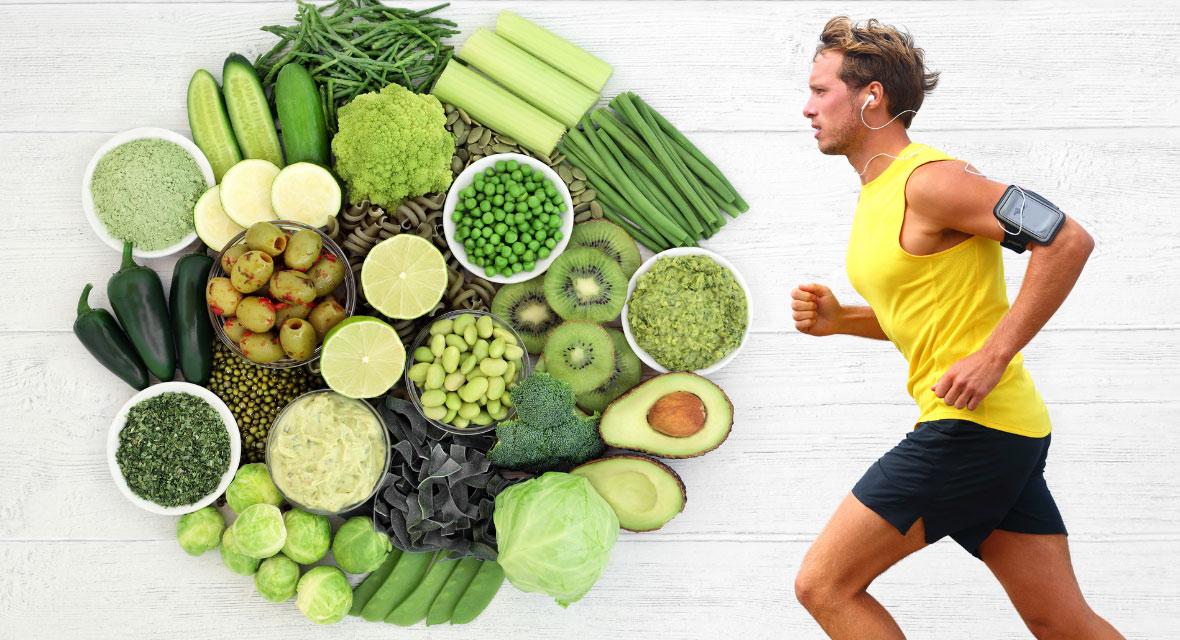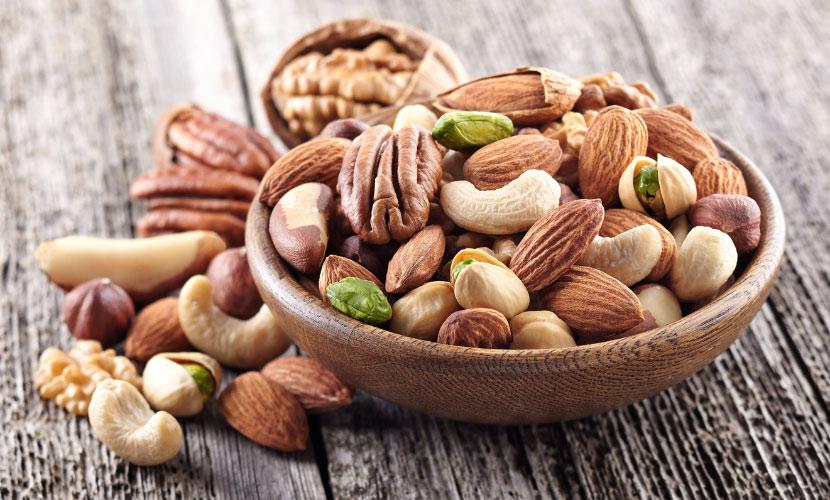🏆 As seen and loved on Shark Tank Dubai 🏆

Athletes and Their Green Diet
A Guide to Plant-Based Nutrition Benefits for the Athletes
Athletes or sportspersons are physique-oriented people for whom eating healthy and nutritious becomes very important. As the body undergoes a lot of stress and pressure daily, it needs precise protein and nutrition. Instead of relying upon supplements, we encourage athletes to opt for a healthy and balanced diet plan that gives their bodies the right amount of vital nutrients.
A green diet should be the first viable option for an athlete's body stamina. A green diet is a plant-based diet that consists of plant-based foods like vegetables, seeds, nuts, grains, legumes, fruits, etc. This kind of diet has zero involvement of animal source foods or artificial components.
Plant-based diets provide all the essential proteins, fats, carbohydrates, vitamins, and minerals for excellent health. They are rich in fiber and phytonutrients. This cannot be called a vegan diet, as it may include dairy, which is strictly prohibited under veganism. Studies prove that eating green diets is good for health as well as for the environment, especially due to the reduction of ozone-depleting greenhouse gas emissions linked with a vegetarian regime.
Nutritional benefits of green leafy vegetables
Have you ever wondered how veterans and the elderly are still stronger than us? The answer would be leafy vegetables. In earlier times, people didn't have access to fast foods and junk foods. The only option they had was vegetables and homemade nonveg food. These meals used to be power-packed with a variety of vitamins and minerals.
For vegetarian people, chowing down on leafy green vegetables is the only option. Consuming green vegetables provide almost all kind of nutrition. It is way healthier as the fat and sugar present in green leafy vegetables in a limited amount also make them suitable for a weight loss diet. Green leafy veggies include mustard greens, spinach, lettuce, kale, Brussels sprouts, Turkish kale, Swiss chard, and arugula.
They also help improve our immune system, act as an anti-aging diet, and protect our body from high blood pressure, cancers, and various heart diseases. This is why the dieticians emphasize sticking to a healthy diet, and for this, we have prepared a completely vegetarian diet plan with the help of these green leafy vegetables. While talking about the sports nutrition diet plan, some important factors to be considered are discussed below.
Proteins
Regarding an athlete's meal, protein is the first thing that strikes our mind. Every day, an athlete's body hustles a lot to get the desired shape and stamina. During this hustle, muscle and bone breakage may occur. Hence, the repairing process becomes crucial. This process is expedited by proteins that help repair and further grow the muscle fiber.
As per research, an athlete needs 1.6 grams of protein intake per kg of body weight. Hence, if an athlete is 100 kgs, he needs 160 grams of protein daily. Whether you are a sportsperson, a swimmer, or a runner, you need more energy than an average person. Proteins provide this excess energy. Veggies and beans like mung beans, fava beans, chickpeas, green peas, edamame, potatoes, asparagus, and broccoli are a few rich sources of plant-based proteins.
Fats

Fats assist in performing various processes in the body, like protecting our organs, extracting and preparing essential nutrients, producing hormones, and acting as a great energy source. Hence, fat becomes an inevitable need for the body. Olive oil, walnuts, peanuts, almonds, avocados, chia seeds, and cacao nibs are rich in fat. An athlete can get an appropriate amount of fats from these resources.
Our expert chefs recommend including healthy fatty food in your meals every day to ensure that the required nutrients are provided to the body. This is essential and can be useful in case the athlete is struggling to get the desired weight. Always keep in mind that the digestion of fats is slower than the other nutrients; hence, consuming fat just before hitting the gym can be harmful.
Carbohydrates
In the world of athletes, it is said that the type of nutrition decides an athlete's performance. The consumption of carbohydrates is vital in dealing with the high demands of a workout tackled by athletes and sportspersons. During exercise, athletes should munch an appropriate amount of carbohydrates to keep blood glucose levels in control. This becomes extremely crucial if the event will happen for a longer duration.
Veggies that are a healthy source of carbs include broccoli, carrot, beet, sweet potato, zucchini, and our good old friend, potato as well. Our master chefs help the athletes by providing the best-customized athlete diet plans, capable of fulfilling the nutrition requirements of an athletic body.
How can an athlete prepare a healthy diet routine?
Consume healthy meals
It takes a lot of work for an athlete to achieve the desired goals. Hence, one should start his day with a healthy meal, and one should consume a variety of fruits and vegetables daily. These vegetables are health-giving sources that are also relatively low in total energy, an effortless inclusion for all athletes, regardless of energy demands.
Instead of eating everything in one go, they should focus on eating at least five servings daily. Fruits and vegetables are excellent energy sources and nutrients required for training and recovery. Moreover, these help in keeping the body immune to the flu and cold.
Iron is a crucial element
Iron is a crucial nutrient for athletes because it carries oxygen to the muscles during workouts, helping the body to exercise. Although the absorption of plant-based iron is not noteworthy compared to the iron obtained from animal-derived foods, few ways to intensify the absorption are available. Techniques include uniting your green vegetables with a source of vitamin C found in other colorful vegetables and fruits such as capsicum, kiwi, mandarin, and tomato; and avoiding the tannins in excess of tea, coffee, and wine, etc.
To maximize iron uptake in foods, it is also important to avoid eating foods high in calcium, such as yogurt, cheese, and milk, simultaneously. Furthermore, these vegetables are also essential sources of potassium and magnesium — two minerals that play a critical role in muscle contraction, lost due to sweating while exercising.
Significance of nitrate
Diets abundant with nitrates have many favorable attributes for an athlete. Nitrates are found in various veggies and can be beneficial for performance due to enhanced blood flow to active muscles. This increase in blood flow translates into greater oxygen distribution that may allow substantial exercise output.
Proper hydration
Drinking water is a must for everyone on this planet. Staying hydrated is very important for athletes too. When these athletes train, they sweat a lot, so the body will dehydrate if adequate water is not consumed daily. Many options are available for staying hydrated, like milk, water, fruit juice, and sports drinks. However, you must remember not to depend only on fruit juices or energy drinks, as they have high sugar content.
The best meal for an athlete
When you train, you need a lot of calories and energy. Healthy, nutritious meal practice is the key to success for you. But keeping up with the busy schedule, it can be quite a challenge. Hence, meal delivery that won't make a hole in your pocket can be the best option. We focus on starting your day with a healthy meal.
Healthy breakfast
A healthy breakfast is essential for athletes as it provides the necessary fuel and nutrients to kick start their day and support their performance. A well-balanced morning meal can enhance energy levels, improve focus, and aid in muscle recovery and growth. By choosing nutrient-dense foods and incorporating a mix of protein, carbohydrates, and healthy fats, athletes can optimize their breakfast to fuel their bodies and support their athletic endeavors. A healthy breakfast includes:
- Nutty chocolate protein pancakes
- Strawberry overnight oats
- Coffee chia seed pudding
- Drinks containing carrot, apple, ginger, turmeric & lemon, etc.
Wholesome lunch and dinner
Wholesome lunch and dinner options are crucial for athletes, as these meals play a vital role in replenishing nutrients, supporting muscle recovery, and sustaining energy levels. A nutritious and well-balanced lunch and dinner provide essential macronutrients, vitamins, and minerals necessary for optimal athletic performance. By incorporating a variety of whole foods, including lean proteins, complex carbohydrates, healthy fats, and plenty of fruits and vegetables, athletes can ensure they meet their nutritional needs and promote overall well-being. It includes the following:
- Vegan white bean salad
- Lentil & vegetable curry with rice & labneh
- Chilli bean-&-bulgur cakes
- Vegetarian paella rice
- Tofu & vegetable stir fry
- Quinoa kale salad with cashews & fresh mint
Summing up
In conclusion, being an athlete is not an easy task. You must be on your guard in order to keep your body healthy and weight in control. We salute the efforts put in by the athletes and sportspersons as these people are hustling for the pride of the country, and their exertions and sacrifice can never be ignored. If you are an aspiring sportsperson and looking for the best advice on meals, we are just a click away.
Reach out to start your fitness journey with us!
Meal Plans
Delivery Details
Legal Information
© 2020-2026 VMeals. All rights reserved. VMeals™ is a trademark of Flip Side Restaurant and Cafe L.L.C
We accept
